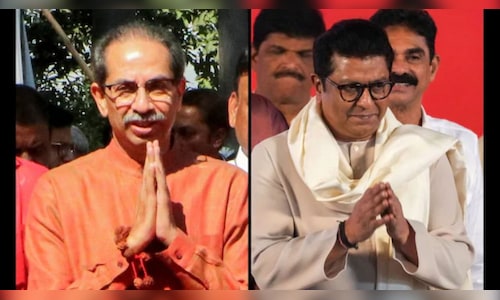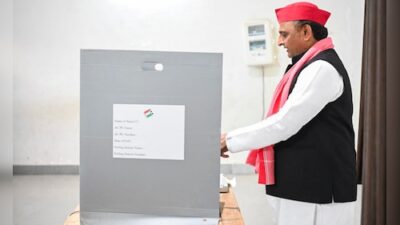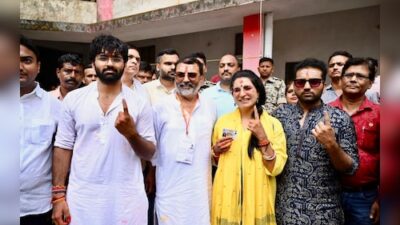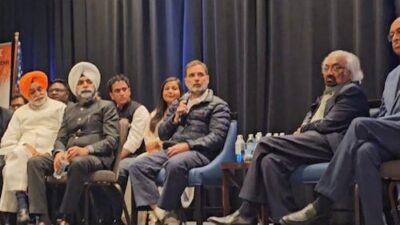Regarding the issue of ‘Marathi manoos’, Raj expressed that his differences with Uddhav were minor compared to the significance of Maharashtra and its people. He showed a willingness to collaborate with Uddhav, as long as Uddhav reciprocated.
News channels and web portals swiftly made this the top story, with headlines announcing Raj’s openness to an alliance with Uddhav’s Shiv Sena Uddhav Balasaheb Thackeray (UBT). Will Uddhav accept? Will he be willing to compromise?
The situation became more complex when Uddhav responded positively but established conditions for Raj.
Not the first time
This isn’t the first instance of a potential reunion between the cousins captivating Maharashtra. Following Raj’s departure from Balasaheb Thackeray’s Shiv Sena, senior Sena members and Thackeray family relatives have made several attempts to bring the cousins together for the welfare of ‘Marathi manoos’ and ‘Maharashtra’. The latest endeavor occurred during the 2017 Brihanmumbai Municipal Corporation (BMC) elections, where talks were initiated but failed to gain traction with Uddhav, who declined to meet Raj’s emissary, preferring to speak with his deputies instead.
Read more: Raj and Uddhav create reunion buzz, both ready to set aside minor disputes for Maharashtra’s benefit
Raj has frequently addressed this incident in speeches and interviews. However, Uddhav’s conditional agreement to a “possible alliance” with Raj is interpreted as a way to test the waters.
Uddhav Thackeray’s dilemma amid the Eknath Shinde challenge
Uddhav, feeling betrayed by party leaders who took the party’s name and symbol and toppled his government, is being cautious. The Bharatiya Janata Party’s (BJP) persistent targeting of Uddhav, aiming to undermine his electoral prospects, complicates matters further. Thus, even with a positive response, Uddhav might not readily embrace this alliance. While his party fell short of expectations in the recent assembly elections, they outperformed Raj’s MNS, which failed to secure a single seat. Significantly, even Amit Thackeray, Raj’s son, lost in a constituency once considered MNS territory.
???? #मुंबई |
मनसे अध्यक्ष राज ठाकरे यांच्या निमंत्रणावरून आज त्यांच्या शिवतीर्थ निवासस्थानी झालेल्या सदिच्छा भेटीत स्नेहभोजन आणि अनौपचारिक चर्चा केली.यावेळी उद्योग मंत्री उदय सामंत, मनसे नेते अमित ठाकरे, मनसे मुंबई शहराध्यक्ष संदीप देशपांडे, मनसे चित्रपट सेनेचे अमेय खोपकर,… pic.twitter.com/2GAes4Neun
— Eknath Shinde – एकनाथ शिंदे (@mieknathshinde) April 15, 2025
By appropriating the Sena party symbol and name, Eknath Shinde has positioned himself as the rightful heir to Sena supremo Balasaheb Thackeray’s legacy, despite not being a Thackeray. A reunion between the cousins would reinforce their claim as the sole legitimate successors to Balasaheb’s legacy, contrasting with a non-Thackeray leader.
The party division has considerably weakened Uddhav, as was clear in the recent state assembly election results. The upcoming local body elections, especially in Mumbai and Thane, where the united Shiv Sena reigned for over twenty years, are now under scrutiny.
What’s in it for Raj Thackeray?
Raj, struggling to gain significant electoral support since 2014, is looking for an alliance to rekindle his political fortunes.
Read more: Shiv Sena (UBT) chief Uddhav Thackeray opposes mandatory Hindi in Maharashtra schools
Raj’s fluctuating political alliances have come at a cost. In the 2014 general elections, he backed Narendra Modi, though the BJP didn’t officially acknowledge the alliance. In the 2019 general elections, he campaigned against PM Modi and the BJP, indirectly endorsing the Congress and Nationalist Congress Party (NCP) in Maharashtra.
However, after being summoned by the Enforcement Directorate (ED) for explanations regarding certain transactions, Raj altered his position, indirectly supporting PM Modi and the BJP again. In the 2024 general elections, he backed the BJP without contesting, anticipating accommodation within the Mahayuti alliance during the state assembly elections. When that didn’t happen, a disillusioned Raj was left to run independently. He couldn’t persuade then-CM Eknath Shinde to avoid fielding a candidate against Amit Thackeray in his first electoral attempt.
Sources indicate that Mahayuti leaders advised Raj to keep a low profile during the assembly elections, promising support in the upcoming municipal polls. During a speech at Shivaji Park for Gudi Padwa, Raj declared he would support Devendra Fadnavis if it benefited Maharashtra. A few weeks later, he hosted deputy CM and Shiv Sena chief Eknath Shinde for dinner, followed by a closed meeting. These actions illustrate Raj’s eagerness to align with the Mahayuti and negotiate for his party’s entry.
Shiv Sena UBT contends that Raj’s proposal of reunion and his show of generosity may have a hidden motive. Political analysts speculate that Uddhav’s conditional approval is a tactical move to avoid being labeled the ‘villain’ once more, as he was in 2017 when he turned away Raj’s emissary.
The hurdles & benefits
This potential alliance, however, faces notable challenges. Both parties target a similar voter base and constituency, risk causing friction between them. Additionally, Raj has adopted a ‘Hindutva’ agenda alongside his ‘Marathi Manoos’ mission to widen his appeal, a strategy Uddhav has also utilized, resulting in a loss of some core Hindutva supporters due to his coalition with Congress and NCP.
Read more: Amit Shah announces AIADMK-BJP alliance for 2026 Tamil Nadu polls
The differing styles and political philosophies of Raj and Uddhav add another layer of complexity. Raj’s confrontational approach might clash with Uddhav’s more diplomatic and reserved nature. Furthermore, the long-standing animosity between the grassroots members of both parties, which has its roots in the MNS’s founding, represents a significant challenge. They have not only competed in elections but have also opposed each other’s policies and political stances.
A strong motivation for both Raj and Uddhav is the opportunity of a united front to attract Marathi voters in urban areas like Mumbai, Thane, and Nashik, which were once strongholds for their respective parties. This alliance could be beneficial in the upcoming local body elections, enabling them to regain ground and reestablish their influence.
Currently, both Shiv Sena UBT and MNS are fighting for political survival. The MNS faces a more critical situation, having struggled to secure substantial support from the people of Maharashtra in both general and assembly elections since 2014.
मराठीसाठी आणि महाराष्ट्राच्या हितासाठी, मी किरकोळ भांडणं बाजूला ठेवायला तयार आहे. pic.twitter.com/SMU1Tq3s98
— ShivSena – शिवसेना Uddhav Balasaheb Thackeray (@ShivSenaUBT_) April 19, 2025
However, significant questions remain — Does Uddhav, with backing from the Congress and Sharad Pawar’s NCP, need the support of a politically weakened MNS? On the other hand, would Raj, looking for a strong partner to rejuvenate his party’s electoral prospects, ally with Uddhav, who has lost his party’s name, symbol, and much of his party’s leadership?



